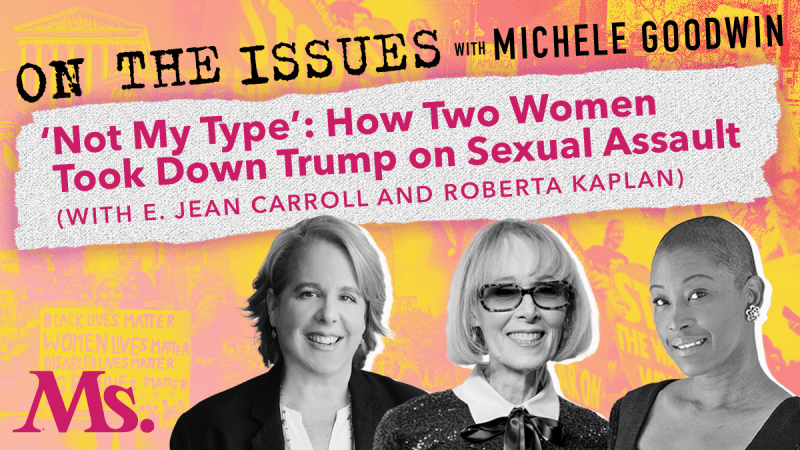At least 27 women have accused President Donald Trump of sexual misconduct, with allegations ranging from harassment to sexual assault and rape. Trump has denied every charge, often dismissing the accusing women by claiming he’d never met them—or suggesting they weren’t attractive enough for him to assault.
In 2019, during Trump’s first term, author, journalist and longtime Elle magazine advice columnist E. Jean Carroll came forward with the allegation that Trump sexually assaulted her in a Bergdorf department store’s dressing room in New York City in the mid 1990s. Trump denied the allegations, prompting Carroll to sue him for defamation and battery under New York’s Adult Survivors Act.
During and after the trial, Carroll faced the typical barbs and gaslighting so often thrown at women who accuse powerful men. Why didn’t she tell the police at the time? Why, after the assault, did she tell people she felt “fine, fabulous”? Why didn’t she bring it up again for more than two decades? Trump himself repeatedly denied the assault and denigrated Carroll on social media, in press conferences and at the trial.
But the jury believed Carroll. In 2023, she won the lawsuit.
Even though dozens of women have accused Trump of sexual harassment and assault, Carroll is the only person whose sexual abuse allegation against Trump has secured a guilty verdict in court. Her new memoir, Not My Type: One Woman vs. a President, released earlier this summer, takes readers behind the scenes of the momentous legal victory. It also hints at the tremendous implications of a woman not only suing Trump—a man who has spent his presidency normalizing violence against women and getting away with it—but winning.
Carroll and her lawyer Roberta “Robbie” Kaplan spoke with Ms.’ Michele Goodwin for a recent episode of the On the Issues podcast, where they discussed the high-stakes legal battle and their groundbreaking victory. After Carroll won $5 million in the initial lawsuit, one year later in 2024, a Manhattan jury forced Trump to pay Carroll an additional $83.3 million for defaming her with false claims throughout the trial—proving, in Carroll’s own words, “He can be beaten.”
Taking On Trump
In their interview, Carroll and Kaplan described their intense preparations for the trial. In the light of other high-profile “he said, she said” cases—most recently, a jury acquitting Sean “Diddy” Combs last month despite Cassie Ventura’s rape and assault allegations—there’s a particular onus on women to make themselves seem “credible” in court, even when it’s clear they have little to gain and everything to lose by speaking the truth. As Ms. reporter Amy L. Bernstein wrote at the time of the trial, “E. Jean Carroll is technically the plaintiff in her civil rape trial against Donald J. Trump. But in terms of spectacle, she has arguably been forced into the role of defendant.”
In Carroll’s case, making the jury believe her involved carefully practicing her responses and honing her court image, down to her in-trial outfits and hairstyle (she wore her hair in a bob, like she did in 1996). “It matters in these cases, sadly enough, how people look, and E. Jean looked like someone to use … to borrow a phrase, that was Donald Trump’s type,” Kaplan shared.
She also believed Carroll’s memories of specific details and her earnestness would convince the jury she was telling the truth, despite Trump’s blustering claims to the contrary. “This story is so weird,” Kaplan remembers thinking. “The details of it are so odd and unique, that there is no way that she made this up.”
Even though false reports of sexual assault are very rare (studies estimate about 2 to 8 percent of all cases), survivors still have to fight to prove they’re telling the truth, even when they aren’t accusing a former president of the United States. Rape remains the most under-reported crime; even though one in five women is raped at some point in her life, only 37 percent of sexual assaults are reported to the police. Even when a survivor reports a rape, less than 4 percent of reported sexual violence cases in the U.S. ever end in a conviction.
In the trial, Carroll and Kaplan leaned on the testimony of two key witnesses, television news anchor Carol Martin and author Lisa Birnbach (best known for co-writing The Preppy Handbook). Both women were friends of Carroll in the 1990s and were two of the only people she told about Trump’s assault of her when it first happened. Carroll recalls that Birnbach told her “[Trump] raped you” and encouraged her to go to the police. But Martin, fearing for Carroll’s safety, told her not to go to the police because of Trump’s influence. “He has 200 lawyers. He’ll bury you.”
“The truth is that, in 1996, it wasn’t bad advice,” Kaplan said. “Had E. Jean gone to the Manhattan DA’s office in 1996 with this story, the chances that anything would have come of it are extremely low, and we all know that Donald Trump is a vengeful, vicious person, and Carol was right.”
But more than 20 years later, Kaplan believes Martin’s testimony helped show the jury that Carroll was telling the truth about what happened to her. As a well-known newscaster whom most people alive in the 90s remember seeing on TV, Kaplan said, “there is no way on God’s green earth that Carol Martin was going to lie for anyone and commit perjury for anyone, even for E. Jean Carroll, her friend.”
Upon Kaplan’s advice, Carroll also met with clinical psychologist Dr. Leslie Leibowitz, who, over the course of hours of therapy, helped Carroll unpack the trauma of Trump assaulting her, which she’d been forced to repress for years. Carroll recalls, “I had a stomachache, because I realized I had lost my entire…I never had a romance after this happened. I never had … never cooked dinner with somebody that I might fall in love with. Never had any of that. You know, that had left my life. So, Dr. Lebowitz brought that front and center to me.” This revelation, she says, “was one of the saddest moments of my life.”
Trump’s Defense
Carroll opens her book with a scene from the trial when Alina Habba, Trump’s attorney, asked her to list all the men she had ever slept with. (“She did it to make me look like a floozy,” Carroll said in an interview.)
Habba—who was also Trump’s controversial appointment for New Jersey’s chief federal prosecutor until her term expired earlier this summer—suggested that Carroll waited until Trump became president to come forward with her allegations in order to garner maximum media attention for her story. “She has gained more fame, more notoriety than she could have ever dreamed of,” Habba told the jury. “She wanted status. We will show you that she wanted the attention, and it was planned.”
Trump lawyer Joe Tacomina also tried to cast doubt on Carroll’s motives, suggesting that she “hates men.”
However, as so many retrospective stories of women involved in the #MeToo movement show, the backlash that women face when they come forward with sexual abuse allegations is traumatizing. Christine Blasey Ford—who has faced harrassment and death threats to herself and her family after accusing Supreme Court then-nominee Brett Kavanaugh of sexual assault in 2018—has since said that if she had known how extreme the backlash would be, she wouldn’t have gone ahead with the public allegation.
Carroll’s new book is surprisingly funny for a description of a sexual assault trial. (The book was a secret up until its release on June 17, with Carroll and the publishing team communicating over Signal, since, “They wanted those books to be in the stores before the White House heard about it.”)
However, she doesn’t hide the abusive backlash that she and countless other women have faced time and time again for coming forward with allegations against powerful men. Since first accusing Trump of sexual abuse in 2019, Carroll has received staggering numbers of online death threats. But she still carried her buoyant energy with her throughout the trial. Kaplan had to coach her not to say “I’m fabulous!” on the stand every time someone asked her how she was feeling.
Kaplan also succeeded in showing the jury that Trump is a liar. She recalls one moment from Trump’s deposition when, after denying that he had ever met Carroll, Trump was shown an old photo of himself and Carroll at an NBC dinner. He incorrectly identified Carroll as his ex-wife Marla Maples (despite his claims that Carroll was “not [his] type”). When Habba immediately corrected him, he tried to claim that the photo was blurry.
“It was classic Trump in a couple ways,” Kaplan says. “One, after Habba interrupts him, he says, in the transcript, oh, yeah, now he understands. He’s like, oh, it’s a blurry photo. So, it’s not a blurry photo. We showed it to the jury as many times as we could possibly get away with, and in my closing argument, I said to the jury, that’s classic Trump. You saw. He realized he was wrong, and then he lies.”
After the jury convicted Trump, Carroll and Kaplan celebrated with champagne. “It was an explosive moment across the country,” Carroll remembers. “Women felt, you know, vindicated, and of course, then the next day on CNN Town Hall, Trump goes on the air and says absolutely everything he just had to pay $5 million for saying about me. So, that’s where Robbie Kaplan comes in.”
When E. Jean Carroll sued Trump twice for defamation, two separate juries awarded her a total of $88.3 million—$5 million in 2023 and $83.3 million in 2024—with Roberta Kaplan serving as her attorney in both cases.
“Trump could not stop,” Kaplan says. “At the second trial, somehow, thinking it was going to change things, he showed up, and then acted like a 14-year-old juvenile delinquent.” She explained that Trump “clowned around,” was contemptuous of the judge and left the trial every day to record videos repeating the defamation, which all added up to the immense sum he has now been forced to pay.
Trump appealed, but just a few weeks ago, on July 10, 2025, the U.S. Court of Appeal ruled that Trump failed to demonstrate that the district court erred in any way and he would not be granted another trial.
Carroll’s social media post? “So long, old man. The United States Courts of Appeals 2nd Circuit bids thee farewell.”
As Goodwin explained in Ms.’ podcast episode, Carroll’s success in winning this battle against Trump has important and much-needed implications, especially right now. “It’s a time in which people are feeling overwhelmed with just the last six months,” she said. “But this is a victory, and it’s an incredibly important victory.”
Great Job Ava Slocum & the Team @ Ms. Magazine Source link for sharing this story.




